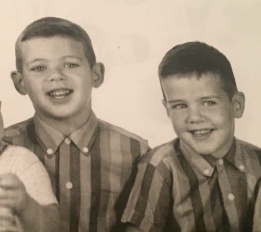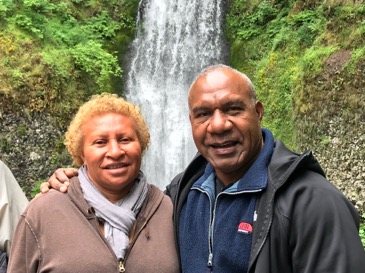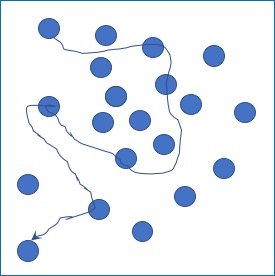Thus says the LORD of hosts: Old men and old women shall again sit in the streets of Jerusalem, each with staff in hand because of great age. And the streets of the city shall be full of boys and girls playing in its streets. (Zechariah 8:4–5)
Half a century before Jesus came into this world, Zachariah gives us a picture of a God-kind-of-city, where old men and women watch while children play in the streets. It is a place of peace – where all things are made right and people flourish. In this section of Scripture, Zachariah tells us that God will return to the city and dwell in its midst. When He does, as G. Campbell Morgan said in his Claim of the Child sermon, it will be a place where the streets will be fit for the kids and the kids will be fit for the streets.
I think we long for such a city, but this is not to be found in many of our American cities. I drove through the midst of my city this week. The damage done to it over the past few weeks saddened me. The elk that has stood at 5th and Jefferson for 120 years was gone. The base of the statue had been burned and it had to be removed to be restored. A protestor sat on the base with an unreadable sign around his neck. The justice center just southeast of the elk was boarded up, litter strewn and covered in graffiti. It stands in stark contrast to Zachariah’s city, where God dwells.
We used to bring our children to this area to walk and enjoy the city’s beauty. We could wander from river, to park, to sidewalk restaurants and to coffee shops. It was beautiful and inviting. For my family, Portland was an eclectic city where people of all kinds shared it with room for one another. It is what attracted so many people to come and live here.
But we won’t bring our grandchildren to Portland’s downtown. Even before Covid-19, the allure of the streets was already gone, so we stopped coming. It is not clean. It doesn’t feel safe. And now, after the unrest, it assaults any notion of peace and human flourishing. I won’t minimize injustice or the importance of recognizing recent protests. But the aftermath! The streets aren’t fit for the kids.
Why has there been a failure in our time, in our culture, to raise a generation eager to take the baton from us and make the next great contributions to America? We saw some glimmer of this at the outset when the focus was on racial injustice. Healing racial wounds would be a great leap forward in our time. But then we saw young people violently parading through the streets rioting, looting, and burning – hell-bent on destruction. Is this the best we can do? How does wanton destruction move us toward any goal of healing? I have listened to people rationalize this as an important expression of angst, but I don’t see it. They burned an elk statue! I mean, what are we to take from that? The iconic elk was a reminder of the time when these majestic creatures roamed this valley (they still do a few miles away). It has become self-evident that here in my city, many of our kids aren’t fit for the streets.
It is time for us to do some serious soul-searching. Let’s start with injustice. To argue that there is not institutional and structural racism is to live in denial. In city after city, in the areas where largely minority poor populations live, the schools are failure-factories. Fatherlessness undermines the family, which should give children a secure place from which to grow, learn and thrive. Many young men from such hopelessness end up in jail. It’s our history – lash laws, forced labor, redlining and internment camps are also part of my city’s past. It was within the last 10 years that developers saw opportunity to profit in North Portland, forcing its minority communities to be displaced to its outskirts. I acknowledge that my memories of Portland have a privileged skew. But I was hoping we were making progress. And even if there was some progress made, there is much that remains undone. We can’t ignore these inequalities in our nation’s cities where our own American children do not get the same chances to make it. I’m hopeful that civic authorities can determine how to correct policies that got us here.
Where does the church stand in all of this?. How do we step up to make a difference? We don’t need to wait for tax-funded initiatives. What if we become present in a new way? What if we form partnerships with those who are making a difference by mentoring young people who are born into parts of the city where they are seriously disadvantaged? What if we provide scholarships to families who want to escape the failure-factory schools and provide the hope of an education? What if we support prison-based organizations that offer an education to people incarcerated from those same streets? What if we become foster families or safe respite homes to alleviate families of children in crisis? What if we lock arms with those who are working with refugees and other displaced people groups to help them make the transition to our culture? What if we turn our resources towards uplifting those hardest hit by poverty through no fault of their own – the children?
Therefore, if anyone is in Christ, he is a new creation. The old has passed away; behold, the new has come. All this is from God, who through Christ reconciled us to himself and gave us the ministry of reconciliation; that is, in Christ God was reconciling the world to himself, not counting their trespasses against them, and entrusting to us the message of reconciliation. Therefore, we are ambassadors for Christ, God making his appeal through us. We implore you on behalf of Christ, be reconciled to God. (2 Corinthians 5:17–20)
It is time for us to be the ambassadors of reconciliation that we have been called to be. Maybe we could see glimpses of God-kind-of-cities with streets fit for kids and kids fit for streets.




 It is hard to imagine this world without Magi Goro. On Sunday morning, while standing in the pulpit and preaching about the cross, Magi suffered a massive heart attack. At the age of 56, he left this world and entered Heaven. I am still shell-shocked at this devastating news. He has been a good friend and an inspiration to me. I don’t know many people who have had more impact on more lives than this man and his wife, Debbie. As a testimony to the impact he has had, there are 25 babies in PNG named after him and 14 after Debbie! They have tirelessly shepherded communities in their corner of the world for decades.
It is hard to imagine this world without Magi Goro. On Sunday morning, while standing in the pulpit and preaching about the cross, Magi suffered a massive heart attack. At the age of 56, he left this world and entered Heaven. I am still shell-shocked at this devastating news. He has been a good friend and an inspiration to me. I don’t know many people who have had more impact on more lives than this man and his wife, Debbie. As a testimony to the impact he has had, there are 25 babies in PNG named after him and 14 after Debbie! They have tirelessly shepherded communities in their corner of the world for decades. I am reminiscing the many stories he and Debbie told me about family, small village life, the Port Moresby city slums, history, miracles, and their own Jesus stories. I remember sitting on his back porch after a kaikai (Pidgin for feast) when he showed me his grandfather’s handmade arrows, which were actually used for both hunting and battle. His was a story of humble beginnings and God-sized dreams.
I am reminiscing the many stories he and Debbie told me about family, small village life, the Port Moresby city slums, history, miracles, and their own Jesus stories. I remember sitting on his back porch after a kaikai (Pidgin for feast) when he showed me his grandfather’s handmade arrows, which were actually used for both hunting and battle. His was a story of humble beginnings and God-sized dreams.
 Guatemala is less than half the size of Oregon. Sitting astride the Ring of Fire, it has 37 volcanoes, some of which still plume. When Spanish Conquistadors arrived, they drove most of the Mayan people into the mountains seizing the region’s fertile plains. They enslave others and imposed Catholicism on everyone. Today, most of Guatemala’s 50 million people are nominally Catholic but retain some belief in their ancestral gods.
Guatemala is less than half the size of Oregon. Sitting astride the Ring of Fire, it has 37 volcanoes, some of which still plume. When Spanish Conquistadors arrived, they drove most of the Mayan people into the mountains seizing the region’s fertile plains. They enslave others and imposed Catholicism on everyone. Today, most of Guatemala’s 50 million people are nominally Catholic but retain some belief in their ancestral gods. Hermann recalls a time after high school when he and a group of youth from his church took a bus ride for about two hours to a remote village. They got off in the middle of nowhere, then hiked into the mountains for another hour through snake-infested jungles. Arriving at their destination, they began inviting people to gather under a nearby tree and hear about God. After several weeks of powerful meetings, the villagers became more hospitable. They offered to share water with them. This was no small courtesy since villagers hiked an hour to their water source. As Hermann took the glass offered to him, he thought, “Should I drink this?” Water-borne diseases were a major problem in these villages. And then he remembered what Jesus had said, “…these signs will accompany those who believe… if they drink any deadly poison, it will not hurt them…”
Hermann recalls a time after high school when he and a group of youth from his church took a bus ride for about two hours to a remote village. They got off in the middle of nowhere, then hiked into the mountains for another hour through snake-infested jungles. Arriving at their destination, they began inviting people to gather under a nearby tree and hear about God. After several weeks of powerful meetings, the villagers became more hospitable. They offered to share water with them. This was no small courtesy since villagers hiked an hour to their water source. As Hermann took the glass offered to him, he thought, “Should I drink this?” Water-borne diseases were a major problem in these villages. And then he remembered what Jesus had said, “…these signs will accompany those who believe… if they drink any deadly poison, it will not hurt them…”
 We joked about our misfit for these seats as he sat down. Gary was on his way to Afghanistan. He retired from the military two years ago and is now an intelligence contractor. He was home with his family for a few weeks over Christmas break and now on his way to a nine-month deployment. When I told him I was a pastor, he asked me, “so will you give me a biblical, theological answer to the question of war?” He had given up on faith on his first deployment.
We joked about our misfit for these seats as he sat down. Gary was on his way to Afghanistan. He retired from the military two years ago and is now an intelligence contractor. He was home with his family for a few weeks over Christmas break and now on his way to a nine-month deployment. When I told him I was a pastor, he asked me, “so will you give me a biblical, theological answer to the question of war?” He had given up on faith on his first deployment. “In Nepal, we all look like we’re about to go somewhere,” Sheila laughed. We were meeting in the home of Dave and Sheila,* our friends in Nepal, and were all bundled up in gloves, scarves and jackets. Though the weather in Kathmandu typically ranges from upper 30s to lower 50s at this time of year, homes aren’t heated. You simply dress for cold when you wake up in the morning and go about your day. It’s like being at an elk camp in Eastern Oregon, only with a whole nation.
“In Nepal, we all look like we’re about to go somewhere,” Sheila laughed. We were meeting in the home of Dave and Sheila,* our friends in Nepal, and were all bundled up in gloves, scarves and jackets. Though the weather in Kathmandu typically ranges from upper 30s to lower 50s at this time of year, homes aren’t heated. You simply dress for cold when you wake up in the morning and go about your day. It’s like being at an elk camp in Eastern Oregon, only with a whole nation. Nonetheless, there was a line that people were drawing between the supremacists in Virginia and the white church. I’m a linear thinker so I have to see things that connect in order to gain a bigger picture. I’m also naively committed to the idea that the people of Jesus don’t want to have anything to do with the kinds of things being said by those white nationalists. After all, to the Christian, love is central to our very being. Jesus demonstrated the love of God towards everyone with an invitation to join His family – where repentant sinners could live with an otherworldly affection for one another. But people of color who I know and respect were making the connection and I wanted to see it, as well.
Nonetheless, there was a line that people were drawing between the supremacists in Virginia and the white church. I’m a linear thinker so I have to see things that connect in order to gain a bigger picture. I’m also naively committed to the idea that the people of Jesus don’t want to have anything to do with the kinds of things being said by those white nationalists. After all, to the Christian, love is central to our very being. Jesus demonstrated the love of God towards everyone with an invitation to join His family – where repentant sinners could live with an otherworldly affection for one another. But people of color who I know and respect were making the connection and I wanted to see it, as well.
 As we sat in an open field, it got dark and cool… and still. The air felt electric. We watched through NASA-approved glasses as the moon cut its path across the sun. An orange globe became a narrower and narrower crescent until all at once – in a surreal moment – the glasses went dark. We removed them and looked again. The moon had obscured the sun. Its light was concealed. But the corona of the sun exploded into the sky, revealed in all its cosmic glory. We could even gaze on it with naked eyes. It is hard to describe the feeling, though everyone in the path of totality knows it. It was brief, but so awe-inspiring that those who saw it attest, “it was worth it.” Worth the early drive, the wait, and the traffic home. If I can ever see another, I will not miss it.
As we sat in an open field, it got dark and cool… and still. The air felt electric. We watched through NASA-approved glasses as the moon cut its path across the sun. An orange globe became a narrower and narrower crescent until all at once – in a surreal moment – the glasses went dark. We removed them and looked again. The moon had obscured the sun. Its light was concealed. But the corona of the sun exploded into the sky, revealed in all its cosmic glory. We could even gaze on it with naked eyes. It is hard to describe the feeling, though everyone in the path of totality knows it. It was brief, but so awe-inspiring that those who saw it attest, “it was worth it.” Worth the early drive, the wait, and the traffic home. If I can ever see another, I will not miss it.